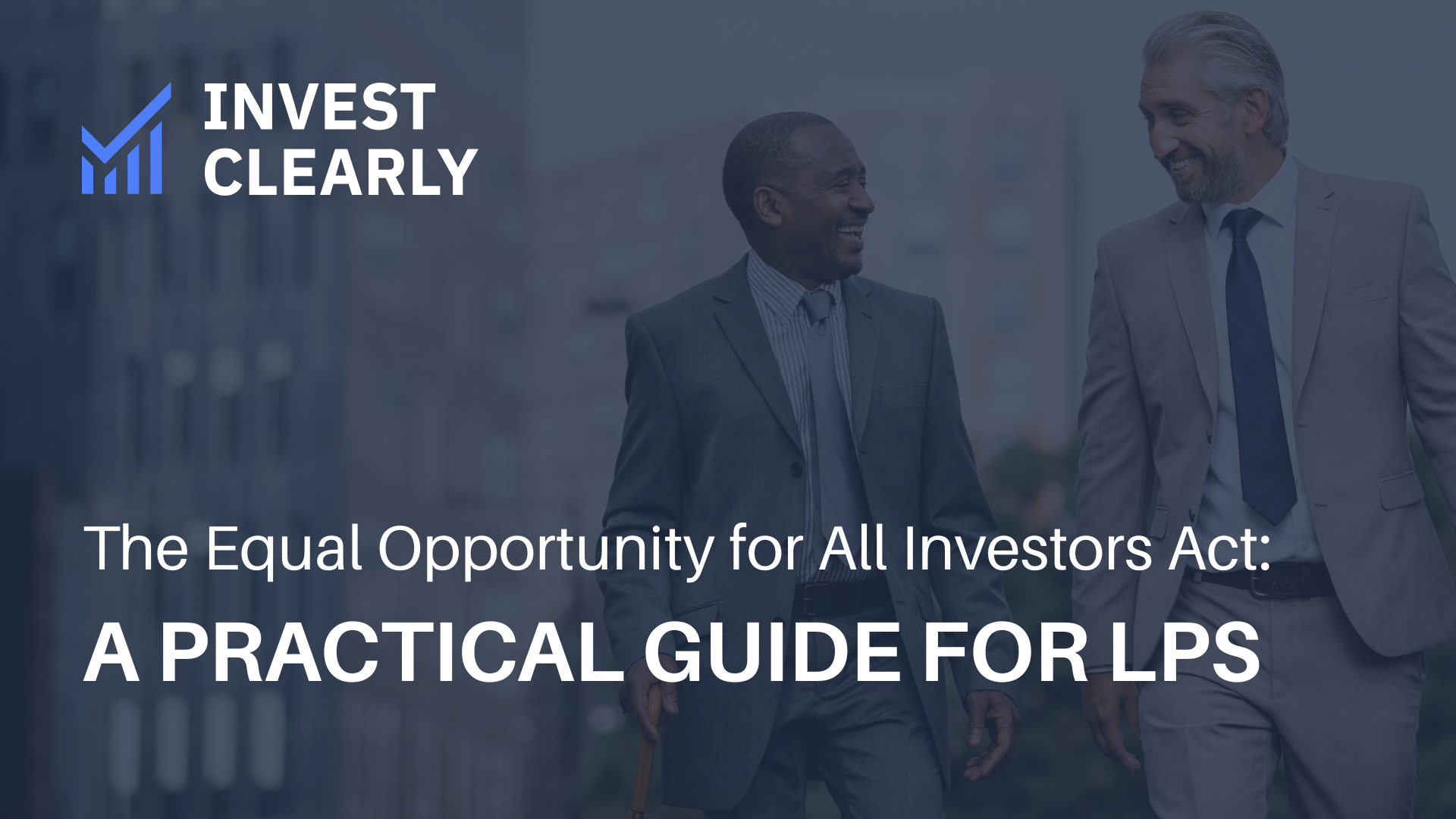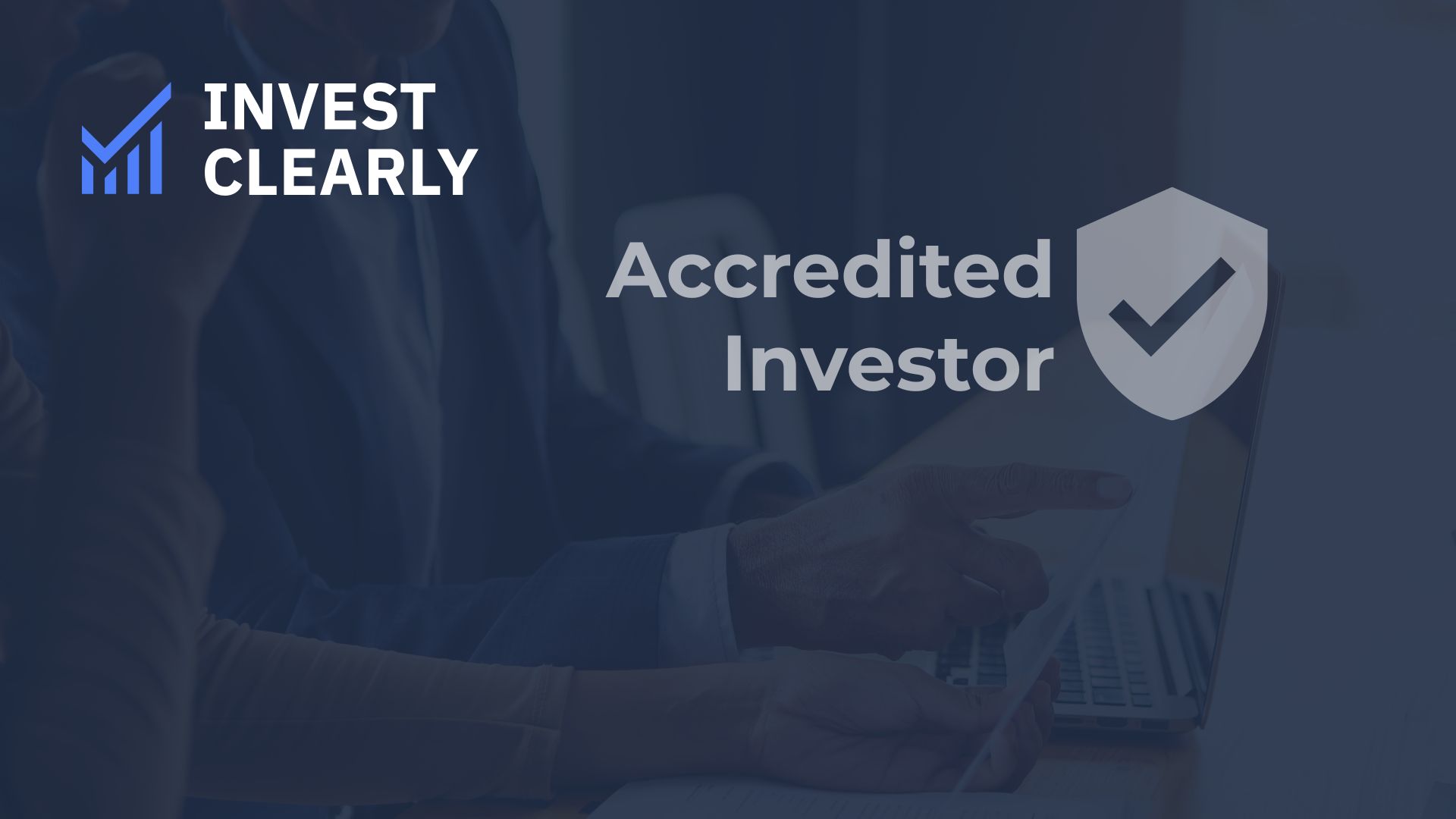
The Equal Opportunity for All Investors Act: A Practical Guide for LPs
Never miss an Invest Clearly Insights article
Subscribe to our newsletter today
The rules of access to private real estate and other private markets may change soon.
On July 21, 2025, the U.S. House of Representatives passed H.R. 3339, the Equal Opportunity for All Investors Act of 2025, by voice vote. The bill was received in the Senate on July 22, 2025 and referred to the Committee on Banking, Housing, and Urban Affairs, where it is pending consideration. However, it is expected that the Senate will pass the Act.
If enacted, the law would add a new knowledge-based path to accredited investor status. As a result, individuals who previously were excluded from private investments would have the option to gain access through a new SEC examination that would then be administered by a registered national securities association at no cost to applicants.

What the Equal Opportunity for All Investors Act Would Change
Currently, to access private real estate investments such as syndications and funds offered under Rule 506(c) of Regulation D, you must be an accredited investor. The SEC defines accredited investors as individuals who meet at least one of the following criteria:
- Income test: Earning more than $200,000 annually (or $300,000 jointly with a spouse or spousal equivalent) for the last two years, with the expectation of earning the same or more in the current year.
- Net worth test: Having a net worth of over $1 million, either individually or jointly with a spouse or spousal equivalent, excluding the value of a primary residence.
- Professional certification or role: Holding certain securities licenses (such as the Series 7, 65, or 82), or serving as a director, executive officer, or general partner of the issuer of the securities being offered.
These thresholds mean that according to an SEC staff report, as of 2022, only about 18 to 19 percent of U.S. households qualified as accredited investors, according to SEC data. That equals roughly 24 million households nationwide.
The Equal Opportunity for All Investors Act of 2025 would significantly broaden this definition. It keeps the wealth- and income-based tests in place but adds a knowledge-based pathway. Under the bill, any individual who passes a new SEC-designed examination would qualify as an accredited investor, even if they do not meet the financial thresholds. The exam will test financial sophistication, including understanding securities, disclosure requirements, corporate governance, financial statements, and the unique risks of private investments such as illiquidity and leverage.
This shift changes the foundation of access: accreditation would no longer be tied only to wealth. Instead, investors could qualify through demonstrated knowledge, effectively opening the private markets to a broader and more diverse group of participants.
When the Exam Could Become Available
The Equal Opportunity for All Investors Act sets out a clear but multi-step timeline:
- Senate approval and enactment.
The bill passed the House on July 21, 2025 and was received in the Senate the following day. It is currently before the Committee on Banking, Housing, and Urban Affairs. If the Senate passes it and the President signs it into law, the clock starts ticking. - Exam development.
Once enacted, the SEC has up to one year to create the certification examination. The law requires the exam to cover securities, disclosure requirements, corporate governance, financial statements, and the risks inherent in private investments, including illiquidity, leverage, and information asymmetry. - Exam administration.
After the SEC finalizes the exam, a registered national securities association must begin administering it within 180 days. Since FINRA is currently the only such association, it will be responsible for delivery. The law also specifies that the exam must be offered free of charge to the public.
What this means in practice:
- If the bill becomes law in late 2025, the SEC’s one-year window runs through late 2026.
- Adding 180 days for implementation means the exam must be live no later than early to mid-2027.
- The SEC could move faster, so the first exams might be available as soon as mid- to late-2026, but the statute gives regulators until 2027.
For LPs, this means planning can begin now, but practical access will not change immediately. Expect a 12- to 24-month window before the first exam-qualified investors can participate in private offerings.
What Investors Can Expect on the Exam
While the SEC has not yet published the final content, the Equal Opportunity for All Investors Act specifies the core subject areas that must be covered. This gives investors a good preview of what to expect when preparing.
Core Topics on the Investor Accreditation Exam
The exam will test knowledge in several areas that reflect both general financial literacy and the unique risks of private offerings. These include:
- Types of securities
Understanding the differences between stocks, bonds, private placements, and alternative assets. - Disclosure standards
Recognizing what information is typically available in registered offerings compared to exempt offerings, such as those under Regulation D. - Corporate governance
Familiarity with roles and responsibilities of boards, executives, and shareholders, and how governance affects investor protections. - Financial statement analysis
Ability to read balance sheets, income statements, and cash flow statements, and identify red flags. - Risks specific to private investments
This includes illiquidity (difficulty selling early), valuation challenges, the potential for loss of capital, leverage risks, concentration risks, limited disclosures, and longer investment horizons.

How Difficult Will the Exam be to Become an Accredited Investor Be?
What remains uncertain is how difficult the exam will be. If the test resembles a basic financial literacy exam, many individuals may qualify with modest preparation. If it mirrors professional licensing exams such as the Series 7, 65, or 82, it will require more intensive study and preparation.
The SEC has discretion in determining difficulty, but Congress instructed that the exam must be “rigorous enough” that only financially sophisticated individuals are likely to pass.
Implications for LPs
For aspiring investors who want to get into private markets as quickly as possible, preparing for the exam will be important. Even though the test is free, it will not be a rubber stamp.
Start now by studying financial concepts and risk management. Your preparation will not only improve the chance of passing but will also help you make smarter decisions once you gain access to private real estate and other alternative assets.
What This Change Could Mean for LPs
As the Equal Opportunity for All Investors Act moves closer to becoming law, limited partners should start thinking about how it will reshape their role in the private markets.
The expansion of accredited investor status through a knowledge-based exam does not just change who can participate; it alters the dynamics of access, competition, and sponsor quality. For LPs, this means new opportunities to enter or expand in private real estate, but also new challenges in evaluating deals and managers.
1) Earlier access if you qualify on knowledge
If you do not meet current income or net worth thresholds, the exam creates an on-ramp based on financial literacy rather than wealth. Passing the exam would open the same offering universe that wealth-based accredited investors see today. Content areas are already outlined in statute, which means prospective LPs can start mapping study plans now.
2) More investors competing for high-quality allocations
With roughly one in five U.S. households already meeting wealth-based criteria, adding a knowledge track could increase the pool of eligible investors further. The degree of expansion is uncertain and hinges on the exam design and pass rates. For LPs, that could translate into faster-filling allocations and tighter subscription windows in oversubscribed offerings.
3) Wider quality dispersion among sponsors
A larger addressable market can attract both strong and weak operators. LP diligence becomes even more important, especially around governance, reporting cadence, fee transparency, and conflict management. Investors will need to be increasingly wary, particularly of emerging sponsors with limited track records.
4) Service models may shift
Platforms and sponsors built to serve many smaller tickets are likely to lean into investor education, structured onboarding, and standardized reporting. Traditional managers focused on fewer, larger LPs may need operational upgrades before they can provide the same experience at scale. Expect variability in investor relations quality during the transition period. This is not a reason to avoid opportunities, but it is a reason to verify readiness.
A Step-by-Step Plan for LPs
The Equal Opportunity for All Investors Act will not transform the private markets overnight. For limited partners, the next 12–24 months provide a runway to prepare.
Step 1: Track the Senate Calendar and Rule Text.
Status today is Passed House on July 21, 2025, Received in Senate on July 22, 2025. Once enacted, mark two dates on your calendar: the one-year mark for the SEC exam to be established and the 180-day mark when administration must begin.
Step 2: Prepare for the Exam with the Statute’s Outline.
Build a study plan around the enumerated topics. That includes securities types, disclosure differences, corporate governance, financial statement literacy, illiquidity and valuation risk, leverage, concentration, information asymmetry, and longer hold periods. The exam must be free and widely available once launched.
Step 3: Refresh Your Sponsor Diligence Framework.
Access alone does not guarantee success. New and seasoned LPs alike should focus on sponsor quality as a key driver of outcomes. This means looking beyond glossy marketing decks and asking tough questions:
- Reporting and transparency: How often do you receive updates? Are financial statements provided on time and in detail?
- Fee structure: Are acquisition, asset management, and promote fees aligned with investor interests?
- Governance and conflicts: What policies exist around related-party transactions, capital calls, and cash management?
Investor support capacity: Can the sponsor handle an influx of smaller investors without diluting service quality?
Relationships take time to build. Start conversations with sponsors now, long before the exam is live. Attend webinars, schedule calls, and evaluate how responsive and transparent a sponsor is in dialogue.
When evaluating sponsors, consult verified investor reviews on Invest Clearly to gain unfiltered insights from current and past LPs. Pairing personal conversations with objective third-party reviews will give you a fuller picture of a sponsor’s strengths and weaknesses.
Step 4: Reconfirm Liquidity Tolerance
Private investments are not liquid, and the Act requires investors to understand that reality. Match commitments to your long-term financial plan, recognizing that capital may be tied up for several years. Ensure you have enough liquidity in safer, accessible vehicles to weather cycles without being forced into premature sales or redemptions.
Prepare for a New Era of Access
The Equal Opportunity for All Investors Act has the potential to reshape private real estate investing by shifting accreditation from a wealth-based requirement to one that also recognizes knowledge and sophistication. For new LPs, the Act could provide earlier access to opportunities that were previously off-limits. For existing accredited LPs, the change will likely mean faster-moving allocations and a broader range of sponsors competing for capital. In both cases, the responsibility to evaluate managers carefully will only grow.
The aspiring accredited investors who will benefit most are those who use the coming months to prepare, not only by studying for the exam, but also by building relationships with sponsors, refining diligence practices, and clarifying their own portfolio strategy.
One of the most effective ways to prepare is to learn from other investors. Experienced accredited investors can help incoming new investors by sharing their experiences about sponsors. Reading verified reviews from fellow LPs on Invest Clearly helps build the transparency this market needs while making more informed decisions yourself.
Access is expanding, but success will still depend on sponsor selection. Start now and use every tool available to make sure your capital is placed with managers who deserve your trust.
Written by
Invest ClearlyInvest Clearly empowers you to make informed decisions by hosting unbiased reviews of passive investment sponsors from verified experienced investors.
Other Articles

Investor Experience Index Q2, 2025: LP Takeaways
Our analysis and evaluation of trends observed in verified investor reviews in Q2, 2025. Here’s what LPs can learn from the data and the questions to ask sponsors when evaluating deals.

What Needs to “Die” in Passive Investing – According to Guests of The Invest Clearly Podcast
Get the answer to the closeout questions of each podcast episode: “What do you think needs to die in passive investing?” The answers are wide-ranging, from misconceptions about risk, to misleading marketing tactics, to structural issues in how deals are presented.

Passive Real Estate Investing Advice from Experienced LP Investors
Experienced LPs shared their most valuable lessons, drawn from years of investing across various asset classes and sponsor relationships.

What Is an Accredited Investor?
Understanding what is accredited investors, how the federal securities laws and the SEC accredited investors definition works, and what it takes to meet the accredited investors requirements is essential if you want to move beyond traditional stocks and bonds and into private markets.

A Guide to Real Estate Investing with a Self-Directed IRA
An SDIRA enables investors to go beyond Wall Street and build wealth through alternative assets like private real estate. This guide will explain how you can use an SDIRA to passively invest in real estate syndications, offering diversification and potential tax advantages for your long-term financial goals.

What Is a Capital Stack?
Every real estate deal needs funding, which is why real estate syndication and private equity investments have become so widespread. However, where that money comes from and in what order it gets repaid isn't random. It's structured carefully, layer by layer, in what's known as the capital stack.